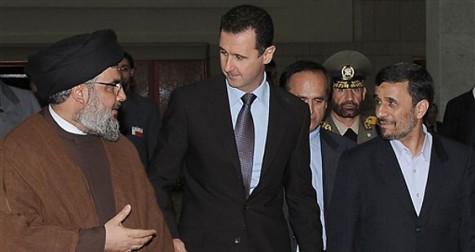
Leaders of Hezbollah in Lebanon, Syria and Iran met to discuss issues of a common interest in the Middle East region and internationally. The meeting comes amid threats of military action against Iran by the United States., a photo by Pan-African News Wire File Photos on Flickr.
Hezbollah Says It Sent Drone That Was Shot Down Over Israel
By NOUR MALAS
Wall Street Journal
BEIRUT—Hezbollah, the Lebanese political party and militia, said it was behind the drone that entered Israeli airspace Saturday and warned it may continue to launch reconnaissance operations over Israel.
Hezbollah admitted to flying a drone over Israel last weekend, which the Israelis shot down. Also, a Yemeni official says Thursday's killing of a U.S. Embassy employee in Sana'a appears to be caused by an al-Qaeda-type group.
.
Hezbollah leader Seyed Hassan Nasrallah characterized the reconnaissance operation, which he said used an Iranian drone assembled in Lebanon, as a major success for the Shiite group and accused Israel of playing down the breach of its territory.
Mr. Nasrallah spoke in a televised address Thursday hours after Israeli Prime Minister Benjamin Netanyahu accused Hezbollah of launching the drone, and vowed that Israel would protect its territory. An Israeli warplane shot down the drone over Israel's southern desert on Saturday after it breached Israeli airspace.
"We are determined to defend our borders...at sea...on the land...and in the air, like the foiling of Hezbollah's attempt over the weekend," Mr. Netanyahu said during a visit to Israel's border with Egypt.
In an apparent response, Mr. Nasrallah said that "This will not be the first time, and not the last," calling it the group's "natural right" to perform reconnaissance in what Hezbollah calls occupied Palestine. "Today, we are revealing a small part of our capabilities," he said. "and we will keep many more concealed…We can reach any [location] we want."
It is the first time Hezbollah boasted about sending Iranian-made drones over Israel. The group, a powerful domestic player in Lebanon and a key ally of Israeli foe Iran, says it is committed to destroying Israel.
Mr. Nasrallah's timing appears bold, analysts say, given the tremendous international pressure on Hezbollah allies Iran and Syria. Hezbollah also has recently come under pressure in Lebanon for its support for the embattled Syrian regime.
Announcing a reconnaissance operation into Israel—which some analysts say was likely done in conjunction with Iran—risks boosting the domestic scrutiny of Hezbollah, and increasing tensions between Iran and Israel.
"Hezbollah is under pressure on several fronts. It has to man the front line with Israel, worry about the Lebanese repercussions of the Syrian civil war, secure its supply lines through Syria, and probably send expertise to Syria to support Assad, all at the same time," said Emile Hokayem, a Middle East analyst with the International Institute for Strategic Studies, a U.K.-based think tank.
"Unilaterally escalating against Israel is unlikely," Mr. Hokayem said. "It is possible that the decision to send a drone has been coordinated, or even ordered by Iran, to send a signal to Israel that it is not immune."
Israel and Hezbollah fought a bloody monthlong war in July 2006 that ended in a stalemate but showed Hezbollah's military capability. Hezbollah's last known attempt to use a drone over Israel came during that war, when the Israeli military shot down over Israeli airspace an Iranian-made pilotless aircraft operated by Hezbollah.Hezbollah also flew drones supplied by Iran into Israeli airspace in 2004 and 2005, while Israel routinely sends fighter jets over Lebanon in a show of strength.
Hezbollah's claim of the latest drone operation raises questions about where the drone took off.
Israeli officials say it was spotted over the Mediterranean, near the Gaza Strip, before it entered Israeli airspace. The United Nations Interim Force in Lebanon, which is stationed along the border with Israel, said over the weekend that it didn't detect a drone flying from Lebanese territory into Israel's airspace.
Mr. Nasrallah also challenged Israel's account that its air force detected the drone over sea but forced it over its land, saying the drone flew through an area "full of U.S.-Israeli [air defense] systems" and arrived in an area close to the Dimona nuclear facility before it was shot down.
Israeli military representatives said the air force allowed the drone to enter Israeli airspace "for operational considerations," but declined to provide further explanation.
In another rare move on Thursday, the Hezbollah leader addressed reports that Hezbollah fighters were battling alongside the regime in Syria. He denied that the group's fighters had a formal presence in Syria but said Hezbollah members who have been longtime residents of towns near the Lebanese border have picked up arms in self-defense and have been killed in the conflict there.
"Lebanese residents of these villages, they took a decision to stay there and defend themselves. This had nothing to do with fighting alongside the regime," he said. "No one has opened up a new front for Hezbollah."
Some observers described both announcements on Thursday as an attempt to divert attention from Hezbollah's role in Syria, which has come under the spotlight over the past week as Lebanese media—including Hezbollah-run media—reported on a growing number of funerals for Hezbollah fighters in Lebanon.
Prior to Mr. Nasrallah's speech Thursday, Hezbollah would only say that its fighters were killed while performing their "duties" for the party, but not where they were killed.
"He had to react to his people being killed in Syria," said Nadim Shehadi, an associate fellow at Chatham House's Middle East and North Africa program. "It will lead to a credibility loss and he needs to find a way of containing it," Mr. Shehadi said.
—Joshua Mitnick in Tel Aviv and Rima Abushakra and Nada Raad in Beirut contributed to this article.
Write to Nour Malas at nour.malas@dowjones.com
No comments:
Post a Comment